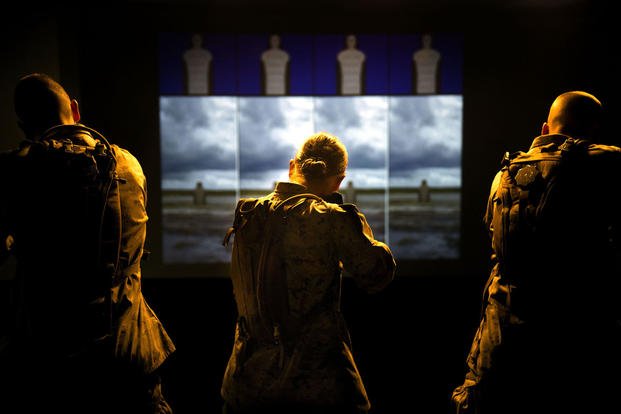The personnel chiefs for the Navy and Marine Corps revealed Tuesday that both services are considering updating their policies to require mandatory processing for administrative separation for troops found to have engaged in abusive social media activity, a move that would make online violations akin to drug use and sexual assault.
Lt. Gen. Mark Brilakis, Marine Corps deputy commandant for Manpower and Reserve Affairs, told Military.com that a task force organized to address the aftermath of a social media scandal implicating Marines is considering the option.
The scandal centers on a private Facebook page called Marines United, where hundreds of active-duty troops and reservists apparently viewed and exchanged nude and compromising photos of female service members without their consent. The Naval Criminal Investigative Service probe into the illicit activity has since expanded beyond the page to other groups and users, NCIS officials said last week.
"There is mandatory processing for administrative separation in a number of different cases. Use of drugs requires mandatory administrative processing, sexual harassment requires mandatory administrative processing, sexual assault requires mandatory administrative processing," Brilakis said, following a congressional hearing on military social media policies on Capitol Hill.
"We are considering whether events wrapped up in Marines United, those things, would rise to the level where the commandant would recommend or direct me to begin mandatory administrative processing for separation," he said.
Processing does not guarantee that an individual will be separated from the service, but it does direct that the relevant commander begin a review, and an administrative board review the case of the service member in question. Such a move would require a change to the Marine Corps separations manual, Brilakis said.
The Navy, which organized a senior leader working group in the wake of the scandal, is considering a similar step, Chief of Naval Personnel Vice Adm. Robert Burke told the House Armed Services subcommittee on personnel Tuesday.
"We are reviewing the [Uniform Code of Military Justice] and Navy policy governing mandatory administrative separation to ensure they are adequate," he said.
The fact that both services are considering such a move, reserved for violations for which the military has a zero-tolerance policy, underscores how seriously the military is now addressing the problem of social media harassment and the pressure from lawmakers to produce results fast.
Similar policies implemented in the 1980s to combat drug use in the services resulted in a huge reduction. According to Defense Department statistics, 47 percent of troops were found to have used drugs in 1973, compared to just 3 percent by 1995. More recently, the military has worked to apply the same approach to sexual harassment and assault, though the results to date have been more muted.
The policy reviews come as multiple lawmakers express outrage at service members' alleged behavior and call for decisive action.
Rep. Carol Shea-Porter, a freshman Democrat from New Hampshire, called on the military to boot offenders, reading aloud from an enlistment document that states troops will be subject to separation if their behavior falls short of military standards.
"I don't know why we have to debate and you tell them at the very beginning and you sign off saying their behaviors are unacceptable," she said. "I don't understand why we have to then pursue many various avenues. Do you still have the power to throw them out if it's very clear they can't do this?"
Brilakis, however, emphasized that everyone in uniform deserves due process and will continue to receive it.
"Whether it be through an administrative procedure or a military justice procedure, there are processes," he said.
-- Hope Hodge Seck can be reached at hope.seck@military.com. Follow her on Twitter at@HopeSeck.






























